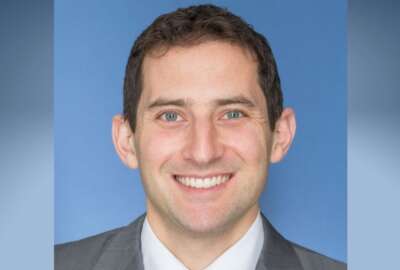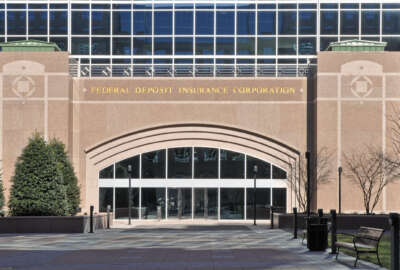

The pandemic changed federal banking regulations. Mainly because auditors could not go to banks in person to check the books and the procedures. Regulators figured...
Best listening experience is on Chrome, Firefox or Safari. Subscribe to Federal Drive’s daily audio interviews on Apple Podcasts or PodcastOne.
The pandemic changed federal banking regulations. Mainly because auditors could not go to banks in person to check the books and the procedures. Regulators figured out a way to do remote bank supervision, but they all did not update their risk profiles, according to the Government Accountability Office. To find out more about what GAO uncovered, the Federal Drive with Tom Temin spoke with Michael Clements, GAO’s director of financial markets and community investment.
Tom Temin: Mr. Clements, good to have you on.
Michael Clements: Thank you for having me, Tom. I’m happy to be here.
Tom Temin: And let’s begin with who are all of the federal bank regulators. Besides [the Federal Deposit Insurance Corporation], there’s quite a roster of them.
Michael Clements: There’s a variety of banking regulators, and it’s a function of the nature of the charter and also the size of the institution. So we start off with the Office of the Comptroller of the Currency, which is a component of [the] Treasury [Department] that supervises nationally chartered banks. Then as you mentioned, we have FDIC, the Federal Reserve, the National Credit Union Administration, which oversees credit unions. And then finally, the Consumer Financial Protection Bureau that oversees the consumer protection laws as it pertains to depository institutions.
Tom Temin: And I guess I’m a little surprised that banking oversight regulation, I can see in the case of resolution where FDIC goes in and — that’s the end, see you later Charlie — wraps up the place. But otherwise, is it still an in person activity to begin with?
Michael Clements: It is. In many instances, it’s an on-site examination. So in fact, the FBI Act requires that the Fed, OCC and FDIC conduct a full scope on-site examination. It’s typically every 12 months, although for smaller institutions, it can be every 18 months. But yes, the examiners will go on site, talk to management, look through loan files and other financial information.
Tom Temin: So these are things that they can’t always do just online or can’t be sent electronically.
Michael Clements: It’s a challenge. And so that was one of the challenges with the pandemic, moving to a completely remote environment, was getting access to both perhaps paper files, especially some of those smaller institutions, but also access to the depository institutions’ financial systems.
Tom Temin: And what did you find that they adapted during the pandemic, when they simply couldn’t get to some of the banks?
Michael Clements: The banking regulators moved quite quickly to identify, assess and then respond to these various challenges. The first step was simply to defer some of the examinations, just to allow the depository institutions to get their feet settled in a new operating environment, but also to expand what’s known as off-site monitoring. So this occurs between those examinations where the banking regulators will examine banks and just monitor the financial conditions. And finally, the banking regulators expanded their technology and also telework options, providing technology that would allow depository institutions to securely send financial information to the banking examiners.
Tom Temin: All right. And so did they all do this pretty much equally? That is to say, were they all equipped properly to continue the mission through the pandemic with these remote means?
Michael Clements: We conducted 20 focus groups with 110 bank examiners, and generally there was pretty positive response to how the agencies were able to continue their mission, very good comments based upon the technology, the telework, and also the communication for management. That said, there were challenges and again, the main challenges focused on some of the smaller depository institutions: Community banks and credit unions that, in many instances, simply had paper files and did not have the means to quickly scan those and convert them electronically, or to provide remote access to their systems.
Tom Temin: Yeah, even this deep into the 21st century, sounds like they still have pass books in some cases.
Michael Clements: There are a number of very small institutions; we have in the past thing seen credit unions that operate on a very limited basis out of the basement of a church, for example. So some of them, yes, do not have access to the high capacity standards that might be needed. And in fact, that’s one of the things FDIC did, which was lend some of these institutions high capacity scanners so that they could in fact, scan loan documents
Tom Temin: And teach people what a scanner is, I suppose too. We’re speaking with Michael Clements, director of financial markets and community investments at the GAO. And you found that what lagged behind the ability to function, then, remote was updating of the auditors risk profiles. Tell us more about that.
Michael Clements: If we had two recommendations in this report, first off, in the case of the Federal Reserve, we recommended that the Fed update its enterprise risk management framework to incorporate risk to its supervision function, and in particular, including the pandemic we saw most of the other banking regulators had done so and updated their framework to recognize these types of new risks that may occur in the future. In the case of OCC, we recommended that they conduct a lessons-learned. All the regulators quite quickly and thoroughly conducted real time monitoring during the pandemic, looking at examiner hours, staffing, the exam process. But we recommended OCC take that additional step just to look at lessons learned to help prepare for the next disruption.
Tom Temin: Is the risk in the disruption one that they won’t be able to do their work as effectively as they could if they can fly around, drive around, drop in and say hi to the bank president and snoop around — my word, not their word — or is the risk simply that the supervision won’t be as thorough and there’s greater risk to the banking system itself or to some sector of it?
Michael Clements: There’s a mix of those two. It is certainly the case that being on site and be able to talk to the bank executives and also employees is helpful. And to see those loan files as well. We did see the case throughout the pandemic, that depending on the risk characteristics of an institution, that the regulators might have either scaled back the scope or deferred some of the examinations.
Tom Temin: Yeah, interesting, because there’s also the effect that the pandemic might have had on the financial situation of those banks, because of people maybe feeling they needed to to hoard cash, or I don’t know, there was lots of reactions at the beginning of the pandemic, since no one knew what the extent would be, that might have affected banks’ cash flow, or reserves, or their actual deposits.
Michael Clements: The pandemic played out perhaps a little differently than people might have thought. At the start of the pandemic, there were concerns, for example, about credit risk, for example, people unable to pay mortgages or other loans. There’s also concerns if you mentioned to notice liquidity risk would the institution be able to pay out the cash? But the fact is the pandemic played out, and perhaps to some extent driven by government policy, with a flood of deposits going into institutions.
Tom Temin: Interesting, that was a strange effect. I think people are spending it down now. And do you find or do you recommend or what’s the sense of whether these remote examining procedures now that they proved to be useful, will continue post pandemic, just to save everybody a lot of travel time and effort?
Michael Clements: There’s been considerations of that. But again, FBI Act does require these on site examinations, and especially for some of the smaller institutions, it seems to be the way to go. And we did find that some of the exams were taking longer than they did in the past. And so in fact, entities such as FDIC had to bring back some retired bank examiners.
Tom Temin: Right. So the law then mitigates against telework, so to speak, when it comes to this particular mission.
Michael Clements: Telework as it pertains to not going actually on site. So banking regulators are a little unique among federal employees. In fact, a fair amount of their time is actually spent outside of their home office, but they’re examining.
Tom Temin: I guess telemedicine would be a better analogy.
Michael Clements: Yes.
Copyright © 2025 Federal News Network. All rights reserved. This website is not intended for users located within the European Economic Area.
Tom Temin is host of the Federal Drive and has been providing insight on federal technology and management issues for more than 30 years.
Follow @tteminWFED


